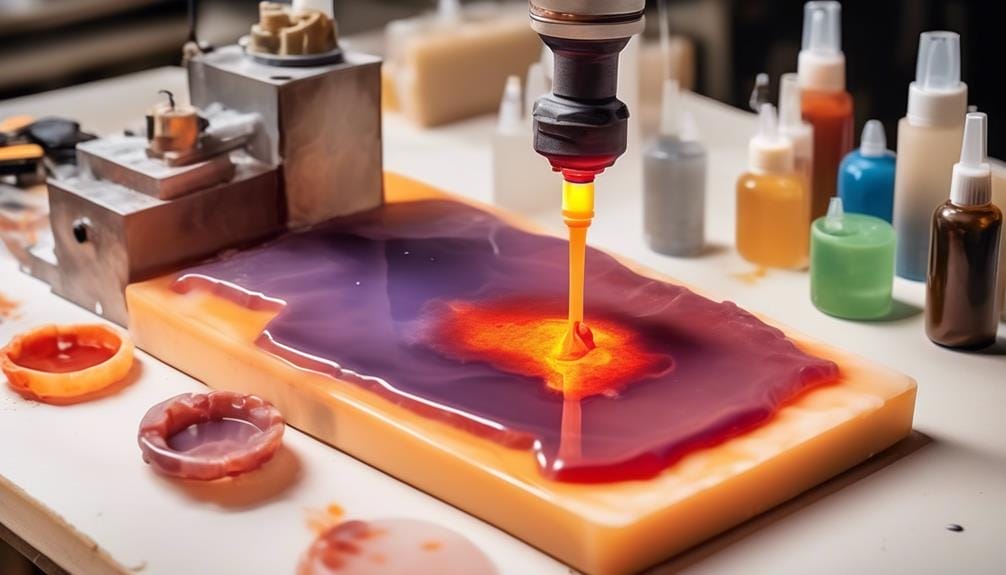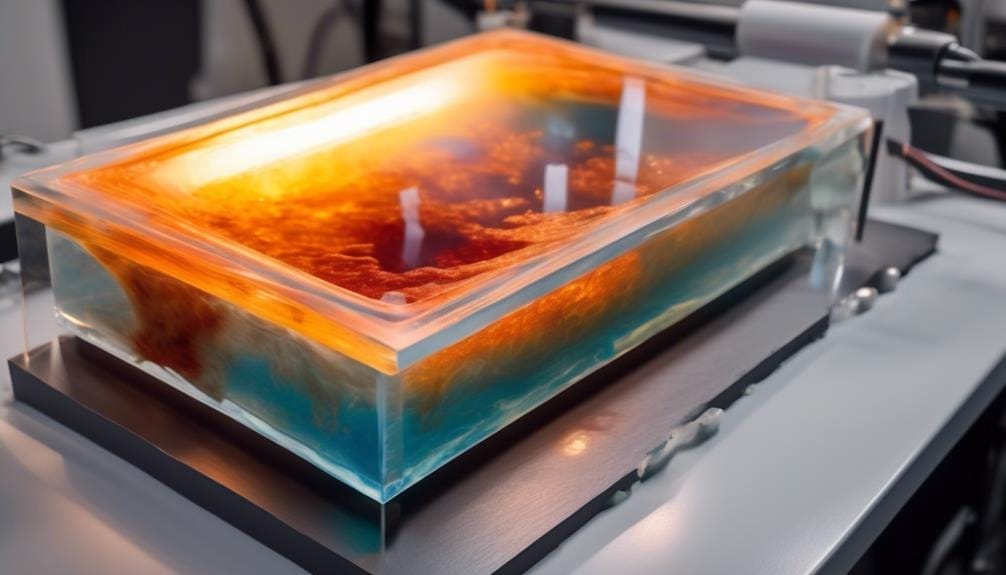Have you ever wondered how temperature can affect the performance of epoxy resin? It’s fascinating to think about the intricate relationship between temperature and the curing process.
But here’s the thing: extreme temperatures, whether too hot or too cold, can actually have a significant impact on the quality and strength of the resin. So, if you want to achieve optimal results with your epoxy resin projects, it’s crucial to understand how temperature affects the curing process.
But what exactly happens when the temperature is too high or too low? And what can you do to maintain the ideal temperature during your resin work?
In this discussion, we will explore the effects of temperature on epoxy resin and discover the best practices to ensure successful outcomes.
Key Takeaways
- The optimal temperature range for working with epoxy resin is 70-74°F (20-24°C).
- Lower temperatures slow down the curing process and make the resin thicker and harder to mix.
- Higher temperatures speed up the curing process, but excessively high temperatures can lead to quick curing and potential imperfections.
- Maintaining the ideal temperature range ensures proper flow and curing while avoiding extreme temperatures that can affect the curing and finish of the resin.
Optimal Temperature Range for Epoxy Resin
The optimal temperature range for working with epoxy resin is between 70-74°F (20-24°C), ensuring proper flow and curing. Temperature plays a critical role in the curing process of epoxy resin, with lower temperatures slowing it down and higher temperatures speeding it up. It’s crucial to maintain the resin within the recommended range to achieve the desired results.
When the temperature drops below the optimal range, the resin becomes thicker and more difficult to mix. This can lead to uneven distribution of the hardener, affecting the curing process. On the other hand, excessively high temperatures can accelerate the cure, making it challenging to achieve a smooth finish. The resin may cure too quickly, resulting in reduced working time and potential imperfections.
To ensure the resin remains within the optimal range, it’s important to protect it from cold weather damage. This can be done by using a protective coating or keeping projects indoors. Rapid temperature changes should also be avoided, as they can negatively impact the curing process.
Temperature’s Impact on the Curing Process
To understand the impact of temperature on the curing process of epoxy resin, it’s important to consider the significant role it plays in determining the speed and quality of the final result. The curing process of epoxy resin refers to the chemical reaction that transforms the liquid resin into a solid, durable material.
Here are five key points to consider regarding temperature’s impact on the curing process of epoxy resin:
- Colder temperatures slow down the curing process, while higher temperatures accelerate it. This means that when working with epoxy resin in colder conditions, you can expect longer curing times.
- The ideal temperature range for working with epoxy resin is between 70-74°F (20-24°C). This range ensures proper flow and curing, leading to a high-quality final result.
- Cold temperatures can make epoxy resin thicker and harder to mix. It’s important to store epoxy resin at room temperature before use to ensure proper viscosity and ease of application.
- Excessive heat can speed up the curing process, affecting the finish of the epoxy resin. This can lead to a brittle and less durable final product.
- Factors such as resin type, humidity levels, and additives can influence how cold weather affects epoxy resin. Using a cold-weather resistant resin can help maintain adhesion properties and improve performance in low temperatures, allowing for year-round projects.
Heating Techniques for Epoxy Resin Work

Considering the significant impact of temperature on the curing process of epoxy resin discussed previously, let’s now explore effective heating techniques for achieving optimal results in epoxy resin work. Maintaining the ideal temperature range of 70-74°F (20-24°C) is crucial for proper viscosity, ensuring easy mixing and application of epoxy resin. However, excessive heat during curing can lead to an accelerated exothermic reaction, potentially causing cracks in the resin. On the other hand, lower temperatures make the resin thicker and harder to work with, while higher temperatures accelerate the curing process. To maintain the ideal temperature for epoxy resin work, using a heating pad or a heated blanket can warm the surface and provide consistent heat. Additionally, opting for cold-weather-resistant resin allows for year-round projects in colder climates while maintaining adhesion properties in low temperatures. The following table summarizes the effects of temperature on epoxy resin work:
| Temperature Range (°F) | Effects on Epoxy Resin Work |
|---|---|
| Below 70 | The resin becomes thicker and harder to work with |
| 70-74 | Ideal temperature range for easy mixing and application |
| Above 74 | The curing process accelerates, potentially leading to cracks |
Using these heating techniques and understanding the effects of temperature on epoxy resin work will help you achieve optimal results in your projects.
Maintaining the Ideal Temperature During Resin Projects
Maintaining the ideal temperature range is crucial for achieving optimal results in epoxy resin projects. The temperature effects on epoxy resin can significantly impact the cure time and overall quality of the project. To ensure you maintain the ideal temperature during resin projects, consider the following:
- Avoid extreme temperatures: Direct sunlight or heat sources can raise the temperature above the ideal range, leading to faster curing and potentially compromising the strength of the resin. Conversely, colder temperatures make the resin thicker and harder to work with, affecting the overall finish.
- Use temperature control devices: Utilize fans to circulate air or heat pads to warm the surface if the temperature is too low. These devices help regulate the temperature and create an environment conducive to proper curing.
- Preheat the resin and hardener: Prior to mixing, preheating the resin and hardener to the ideal temperature range can help maintain the desired temperature throughout the application process. This step ensures consistent curing and optimal results.
- Work in small batches: Mixing smaller amounts of resin at a time allows for better control over the temperature. It also minimizes the risk of the resin curing before it can be properly applied.
- Consider environmental factors: Factors such as the type of resin used, temperature range, humidity levels, and presence of additives can influence the resin’s reaction to cold weather. It’s essential to take precautions and protect the resin from damage caused by extreme temperatures.
Effects of Cold Weather on Resin Curing

Cold weather significantly impacts the curing process of epoxy resin, potentially compromising its adhesion properties and hardening time. When exposed to cold temperatures, epoxy resin becomes more brittle and prone to cracking or shattering. Freezing temperatures can slow down the curing process, affecting the resin’s ability to bond effectively and achieve its desired hardness. The exothermic reaction, which generates heat during the curing process, is also affected by cold weather. As temperatures drop, the exothermic reaction slows down, prolonging the time needed for the resin to cure fully.
Several factors can influence how epoxy resin reacts to cold weather. The type of resin used, temperature range, humidity levels, and the presence of additives all play a role in determining the resin’s response to cold temperatures. To mitigate the effects of cold weather on resin curing, it’s crucial to take precautions.
Storing epoxy resin in a controlled environment, warming it before use, and allowing extra curing time for projects are all recommended. Additionally, using cold-weather resistant resin can help withstand lower temperatures without becoming brittle, ensuring better adhesion and faster curing times in cold weather conditions.
Increasing Resin Temperature for Better Results
To achieve better results with epoxy resin, it’s recommended to increase the resin temperature within the optimal range of 70-74°F (20-24°C). By doing so, you’ll experience improved flow and leveling as the resin’s viscosity decreases.
Additionally, the curing process will be accelerated, reducing the overall project time.
Optimal Temperature Range
Increasing the temperature of epoxy resin within the optimal range of 70-74°F (20-24°C) accelerates the curing process, resulting in faster project completion. Maintaining the resin temperature within this range offers several advantages:
- Easier Application: The resin becomes more fluid at higher temperatures, making it easier to mix and apply.
- Proper Curing: The optimal temperature range ensures the resin cures evenly and thoroughly, leading to stronger bonds and a more durable finish.
- Consistent Viscosity: Working within the recommended temperature range helps maintain a consistent viscosity, allowing for better control and smoother application.
- Maximum Strength: By curing at the optimal temperature, the resin achieves its maximum strength, ensuring long-lasting results.
- Improved Efficiency: Faster curing times mean projects can be completed more quickly, increasing productivity and reducing downtime.
Improved Flow and Leveling
When the epoxy resin temperature is raised within its optimal range, it enhances flow and leveling properties, resulting in a smoother application and reduced need for excessive manipulation. Increasing the resin temperature lowers its viscosity, allowing it to spread and self-level more effectively. This reduces the likelihood of air bubbles and uneven surfaces, ensuring a better surface finish.
With improved flow and leveling, there’s minimal need for sanding or polishing, saving time and effort during the finishing process. Elevating the resin temperature also promotes better adhesion, reducing the risk of surface defects or imperfections during curing.
To achieve these benefits, it’s crucial to monitor and control the temperature of the working environment and resin. By optimizing flow and leveling properties through temperature control, epoxy resin can cure properly, enhancing working time and delivering superior results.
Accelerated Curing Process
Raising the temperature of epoxy resin can significantly accelerate the curing process, resulting in improved results and shorter curing times. The effects of temperature on the curing process of epoxy resin are well-documented, and understanding this relationship can lead to better outcomes in various applications.
Here are five key points to consider when it comes to the accelerated curing process:
- Increasing resin temperature speeds up the chemical reactions involved in curing, leading to faster curing times.
- Higher temperatures can enhance the flow and leveling properties of the epoxy resin, resulting in a smoother and more even surface.
- It’s important to exercise caution when using high temperatures for accelerated curing, as it can potentially lead to exothermic reactions and compromise the integrity of the final product.
- Maintaining the resin within the ideal temperature range is crucial to ensure proper curing and achieve maximum resin strength.
- Preheating the resin and hardener components to the recommended temperature before mixing is recommended for optimal results in the accelerated curing process.
Storing Epoxy Resin at the Right Temperature
To ensure proper curing and viscosity of epoxy resin, it’s crucial to store it at the appropriate temperature. Temperature has a significant impact on the curing process and viscosity of epoxy resin. Colder temperatures can slow down the curing process, making it difficult to achieve the desired results. Additionally, low temperatures can also affect the resin’s viscosity, making it thicker and harder to work with.
For optimal results, it’s recommended to store epoxy resin in a temperature-controlled environment. The ideal temperature range for working with epoxy resin is between 70-74°F (20-24°C). This temperature range ensures proper flow and curing of the resin. It’s important to avoid exposing the resin to direct sunlight or heat sources that can raise the temperature above the ideal range.
In colder weather conditions, it becomes even more crucial to store epoxy resin in a controlled environment. Cold temperatures can significantly impact the resin’s viscosity and make it challenging to work with. To improve the flow and workability of epoxy resin in cold weather, it’s advisable to warm it before use.
Understanding Epoxy Resin’s Temperature Resistance

Understanding the temperature resistance of epoxy resin is crucial for ensuring its proper performance and durability. Temperature plays a significant role in the curing process of epoxy resin, affecting its viscosity and curing time.
Here are five key points to consider regarding epoxy resin’s temperature resistance:
- Curing Process: Temperature directly impacts the curing process of epoxy resin. Colder temperatures slow down the curing process, resulting in a thicker resin, while higher temperatures accelerate curing and can affect the resin’s behavior.
- Ideal Temperature Range: The recommended temperature range for working with epoxy resin is between 70-74°F (20-24°C). Within this range, the resin flows properly and cures effectively, ensuring optimal performance.
- Factors Influencing Reaction: Several factors influence epoxy resin’s reaction to cold weather, including the type of resin used, temperature range, humidity levels, resin layer thickness, and the presence of additives or fillers. These factors must be considered to determine the resin’s temperature resistance.
- Protection Against Cold Weather Damage: To protect epoxy resin from cold weather damage, it’s essential to store it in a temperature-controlled environment. Additionally, using a heat source to warm the resin and avoiding rapid temperature changes can help maintain its performance and durability.
- Performance Considerations: Understanding epoxy resin’s temperature resistance is crucial for achieving the desired performance. Extreme temperatures can affect the resin’s strength, adhesion, and overall performance, so it’s important to consider temperature requirements during application and use carefully.
Frequently Asked Questions
Does Temperature Affect Epoxy Resin?
Yes, temperature affects epoxy resin. It impacts the curing process, thermal expansion, heat resistance, thermal shock, and temperature stability. The optimal working temperature is 70-74°F (20-24°C) to ensure proper flow and curing.
What Temp Can Epoxy Resin Withstand?
Epoxy resin exhibits impressive thermal stability and heat resistance. It can withstand temperatures within specified limitations, preventing thermal degradation and maintaining its structural integrity. Moreover, epoxy resin demonstrates excellent thermal conductivity for efficient heat transfer in various applications.
How Cold Is Too Cold for Epoxy?
In cold weather, epoxy resin can be negatively affected. It may freeze if exposed to temperatures below its freezing point, causing damage to its structure and weakening its strength. Proper storage temperature and precautions are crucial to prevent these issues.
What Is the Maximum Operating Temperature for Epoxy?
The maximum operating temperature for epoxy resin is typically around 140-150°F (60-65°C). High temperatures can impact the thermal stability, mechanical properties, and curing process of epoxy, leading to degradation of the resin.
Conclusion
To achieve optimal results with epoxy resin, it’s crucial to consider and maintain the temperature carefully during the curing process. Extreme temperatures, whether too hot or too cold, can have a significant impact on the quality and strength of the resin.
Interestingly, studies have shown that even a slight deviation from the recommended temperature range can result in a 25% decrease in the resin’s curing efficiency. Therefore, precise temperature control is essential for successful epoxy resin projects.





